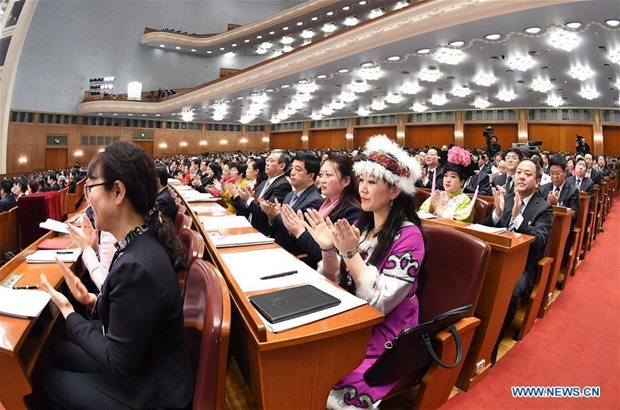The 2018 two sessions and China's future
- By George N. Tzogopoulos
 0 Comment(s)
0 Comment(s) Print
Print E-mail China.org.cn, March 13, 2018
E-mail China.org.cn, March 13, 2018

The fourth plenary meeting of the first session of the 13th National People's Congress (NPC) is held at the Great Hall of the People in Beijing, capital of China, March 13, 2018. (Xinhua/Rao Aimin)
At this time each year China's two sessions are attracting international attention. But the 2018 NPC and the CPPCC meetings are distinct because they are taking place after the 19th National Congress of the CPC which had already endorsed Party's General Secretary Xi Jinping's leadership.
With Xi being the core leader, this year's NPC and CPPCC are deliberating and discussing the deepening of institutional reform within the CPC and the state institutions. While some new figures are soon expected to undertake their new duties in key governmental positions, the CPC is enhancing intra-party discipline and the state institutions are improving their operation.
Inter alia, China will set up its first national supervision commission which will function as a state organ and cooperate with relevant commissions at the regional level. The NPC Standing Committee members will supervise the national supervisory commission, but they – and the ones of the local people's congresses – will not hold office in supervisory organs.
Foreign Affairs journal sees the national supervision commission as a "watchdog," a supreme anti-corruption agency "simplifying the system within a single body, providing additional resources, and reducing manipulation by local officials." Some pilot programs of this commission show a substantial increase in the number of officials being targeted. The Beijing Municipality and the provinces of Shanxi and Zhejiang have participated in the experimental project.
Furthermore, it is wise for the Chinese government to take specific measures in order to boost collaboration between the central administration and regional bodies. The coordination of actions of relevant supervision commissions constitutes an example but is not the only one. After this year's two sessions, more cities will be given legislative power to make local laws and regulations.
This will happen under the condition that they will not contradict the Constitution as well as national and provincial laws and regulations. China is a huge country and the better distribution of power will be critical. Even at the regional level, the legal empowerment of cities will certainly improve governance.
In the years to come, Chinese policymakers will act to develop socialism with Chinese characteristics, a socialist market economy, necessary structural reforms, ecological adjustment and technological achievements. They will also contribute to national rejuvenation endorsing patriotism but denouncing hegemony.
The decision to increase the defense budget by 8.1 percent in 2018 reflects Beijing's determination to adopt a muscular approach to protect its national interest. At the same time though, the preservation of peace remains the top priority. The CPC Central Committee is thus proposing that the future of China should be closely linked to the future of the world.
Although this constitutional amendment is not widely discussed, it implies that multilateralism and cooperation are pursued as a matter of principle. Within this context, the implementation of the Belt and Road Initiative is relevant. The Beijing administration is in the process of helping with financing and tax coordination.
All in all, this year's NPC and CPPCC sessions are another step towards success in China. Less than three years ago, political theorist Daniel A. Bell published an influential account on the Chinese model. His book elaborates on the special features of China's unique political system and principals of meritocracy. At that time, Bell connected the country's good governance to the impressive economic success. His relevant argumentation could be perhaps enriched today, including additional aspects of social, economic and foreign policy.
George N. Tzogopoulos is a columnist with China.org.cn. For more information please visit:
http://www.china.org.cn/opinion/GeorgeNTzogopoulos.htm
Opinion articles reflect the views of their authors, not necessarily those of China.org.cn.






Go to Forum >>0 Comment(s)